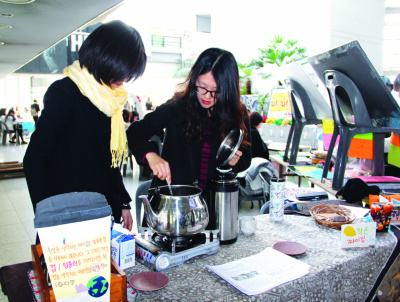
The sweet fragrance of chai tea spreads around the booth, drawing in curious passers-by. As they attentively lift up the cup and carefully taste the milky brown liquid inside, a warm coziness engulfs them and leaves them with a sense of trivial and simple happiness.
Chai tea is a type of traditional Indian tea, and Little Chai House is a club in Ewha that makes and sells chai tea as a fund-raising activity. As one of the main clubs in Ewha, Little Chai House persistently sets up the chai tea booth twice a week in front of Hak-gwan to raise a small fund for the children in India.
The little chai house concept was originally created by a student who had visited India for a Buddhist training and was greatly affected by children’s poor living conditions. As an effort to always be reminded of those children even during her daily life in Korea, the student created the Little Chai House. The organization exists in various universities nation-wide.
However, while most of the other little chai houses in other universities do have some relations with Buddhism, what is different and unique about Ewha’s Little Chai House is that it does not have anything to do with religion. It separated from the other organizations and is now an independent, non-religious club.
“Many students mistakenly think that we are a religious organization or are related to heathen pagan,” said Lee Eun-byul (Sociology, 4), a member of Little Chai House. “Because of this image, a number of people doubt our motives and have difficulty approaching us, making it a little difficult for us to conduct our activity.”
Contrary to some Ewha students’ doubtful suspicions, Little Chai House is a place for everyone to come and enjoy some tea without feeling burdened. The price of a cup of chai tea is five hundred won.
“Previously, there used to be no set price for the tea and we asked our customers to donate small sums of money freely,” Lee said. “But some people felt pressured by this, so starting last fall semester, we decided to set an exact price.”
All of the collected money is donated to JTS (Join Together Society), a non-government organization working for the eradication of international famine, disease and illiteracy. Thus, Little Chai House puts more emphasis on the meaning of its activities rather than making profit.
As a principle, Little Chai House does not use disposable paper cups but uses porcelain cups in regard of the environment.
“We thought we should minimize the amount of trash we generate while doing fund-raising activities and protect the environment,” Lee said.
Little Chai House serves as a place for meeting and interacting with other people.
“Thanks to Little Chai House, I had the opportunity to talk with other people a lot and became more active,” Lee said.
“My favorite part of this club is standing in the booth when the weather is wonderful and listening to other students’ chats and stories.”
Working at a booth outdoors may have its perks during clear days, but it also has its downsides. The members of
Little Chai House often experienced difficulties due to the weather. Because their booth is located outside and they have to use porcelain cups, their customers have to bear with them through unkind weather conditions such as heat, cold or wind. Despite such issues, some people repeatedly visit the Little Chai House booth and become regular customers.
“There is a graduate school student who regularly visits our booth,” said An Seung-hyun (Business Administration, 2), a member of Little Chai House. “She always exclaims that our chai tea is delicious and brings friends over to taste our tea. She sometimes brings us spare cups for us to use. I love it when such regular customers come visit our booth.”
One of the special things about Little Chai House is that it regularly opens up a booth.
“I don’t think there are any other clubs that opens a booth every week,” An said. “Because of our constant activity, the club members continuously gather together. It may be a small, plain thing but for me it is a joy and a pleasure.”
For future club activity plans, the members of the club hope to open up booths fixedly every day, instead of just twice a week. In addition, the club is considering developing a new menu for sale such as lassi, a cold Indian yogurt drink.
“We hope Ewha students would freely come join us for a cup of delicious chai tea,” Lee said. “They do not have to worry about religious issues or even having to pay for the tea. Just come relax and enjoy some tea.”
Jang Ji-won
jiwon9402@ewhain.net

